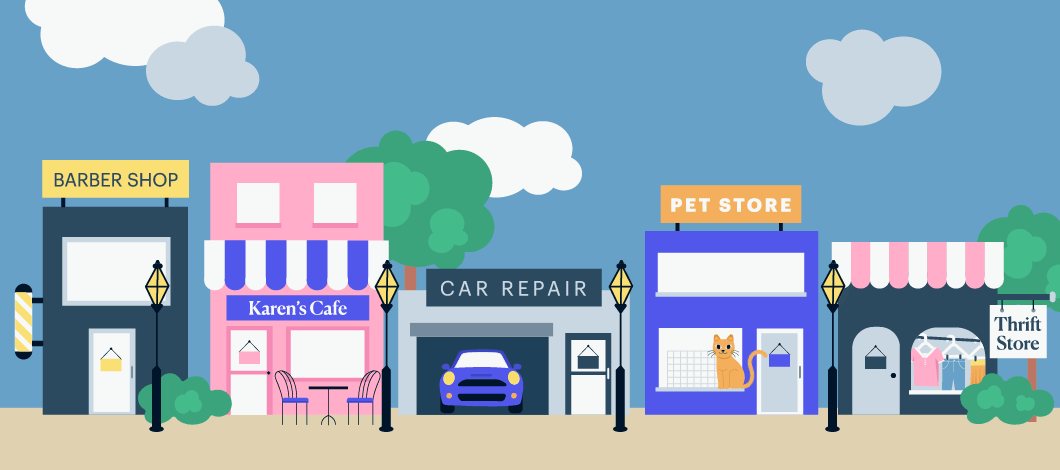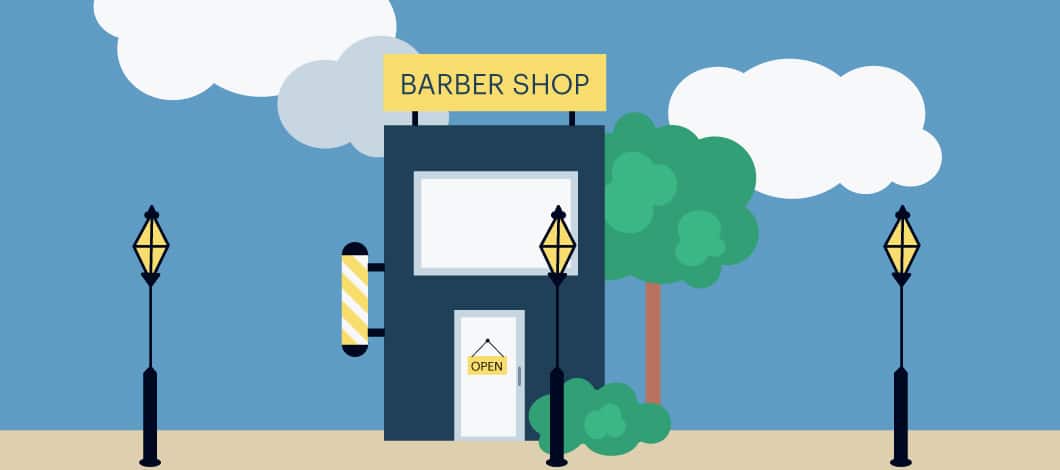Before starting a small business, it’s important to understand how your location can impact your success.
Although being based in a city might feel like an obvious choice to maximize profits, the truth is that small towns have needs that are often being unmet, leaving potentially lucrative opportunities for many business owners.
If you’re an aspiring entrepreneur who enjoys the laid-back country lifestyle, wants to raise your kids outside a metropolis or simply wants to help improve your community, consider these 10 best small town business ideas.
Our List of 10 Best Business Ideas for Small Towns
Whether you’re looking to start a successful small business out of a home office, open a brick-and-mortar storefront or offer services on a traveling basis, here are some of the best business ideas for small towns.
1. Home Cleaning Services
Successful small town businesses don’t necessarily need to shoulder huge operational costs. You could easily start your home cleaning business without renting out an office space or other facility.
If hiring employees isn’t attainable at this point in your entrepreneurial career, it is possible to make a solid living on your own. After all, cleaning businesses are no small matter: Market research suggests that the global cleaning industry will likely reach an impressive $74 million by 2022.
Job search website Glassdoor notes house cleaners earn an average base salary of slightly more than $24,000, as of late January 2021.
2. Pet Store and Grooming
Pets make more than just furry friends. They also present several business ideas for small towns. For example, veterinary services are typically in demand, although creating a vet clinic involves lots of education, a well-trained staff and possibly prohibitive costs. However, vet fees are far from the only expense that owners are willing to shell out for their pets.
Americans spend $1,201 on average each year on their dogs and $687 a year on their cats, according to TD Ameritrade’s Pets & Finances Survey conducted in 2020.
Consider opening a pet store where you sell products and offer dog grooming and training services. Or perhaps start a grooming-only business, either mobile, from your home or at a storefront location. Either of these could be small town businesses that work.
According to ZipRecruiter, the national average salary for pet shop owners is $49,174, while the salary for groomers averages about $33,800, as of Feb. 2021.
3. Liquor Store
While operating a business that sells alcohol has different licensing requirements among states, a liquor store is another viable small town business idea. Liquor has always been a lucrative industry, and the pandemic has seen a skyrocket in alcohol sales.
The earnings you could make from running a liquor store could range from around $28,000 to almost $43,000,735 on average, according to ZipRecruiter.
4. Resale or Thrift Store
The second-hand retail market is set to be worth an astonishing $64 billion by 2024. Consignment, thrift and resale stores can lower overhead costs for owners since oftentimes the products come to you. You may receive donations or customers might come to you with a product they want you to buy from them or sell in your store.
The benefits of thrift stores often expand to the community. On top of having an environmental upside, second-hand goods can offer low-income and local residents the opportunity to purchase clothing, furniture, housewares and school supplies for affordable prices.
According to Jan. 2021 data from PayScale, consignment store managers average a little more than $49,000 annually.
5. IT Services
Information technology (IT) may not initially seem like the best small business idea for a small town, but in an age of data breaches, IT professionals are in demand. According to the U.S. Bureau of Labor Statistics, computer support specialists, information security analysts and system analyst jobs are expected to grow at a faster-than-average pace from 2019-2029.
If you choose to take your IT business to a small town, your customer base could include local governments, school boards, colleges and vocational schools, hospitals and clinics, other small businesses and even individuals. You also could seek clients in nearby towns.
IT service technicians earn nearly $37,500 on average, based on Feb. 2021 data from Glassdoor.
6. Car Repair Services
Arguably an essential business for small towns is a car repair service. One of the reasons this business idea makes our list is because rural populations are typically more dependent on personal vehicles than in cities. Convenient public transportation is often lacking in small towns.
The national median salary for automotive mechanics is just shy of $40,200, according to Salary.com from January 2021.
7. Laundromat or Dry Cleaner
Oftentimes, small town businesses that thrive are ones that offer services people need. Many Americans depend on dry cleaners and laundromats to clean clothes, bedding and area rugs. Many dry cleaners also offer alteration and tailoring services, which could be needed in a small town.
If your town doesn’t have a coin laundromat or dry cleaner and you find there’s a need in your community, this could be a good fit for you. The average salary in the dry cleaning industry is roughly $42,400, according to December 2020 data from PayScale.
8. Personal Care Services
While the U.S. Bureau of Labor Statistics, anticipates job growth for hairdressers to decline, it does forecast growth for other beauty care sectors.
If you have a background working in the beauty and wellness industry, you might be interested in opening a spa or salon in a small town. If you prefer, you could offer services out of your home or travel to your clients’ homes.
Services could include waxing or make-up for special events. Manicures and pedicures are another option. If you’re training in massage therapy, you might offer that as well, along with aromatherapy sessions.
According to ZipRecruiter data from late Jan. 2021, salon owners average about $47,250 annually.
9. Child-Care Services
Most parents of infants and young children have to work. There’s no exception in a small town.
When kids aren’t old enough to attend school, where can they go? Unless a parent can rely on a close family member or friend, chances are, they’re going to need help.
You could offer babysitting services, operate a daycare out of your home or open a small facility in town. Once you gain a few clients, all it may take is a few referrals to get your business off the ground.
PayScale notes a child-care provider averages $32,000 annually.
10. Bakery
Bakeries are often reliable, profitable businesses for small towns. They can be great businesses for creating personal relationships with customers and developing a base of loyal regulars.
Even if your small town has an existing bakery, chances are you’ll get business too. Anyone with a sweet tooth is usually drawn to trying new treats.
When compared to restaurants, bakeries can have better hours of operation, fewer menu items and more pre-orders. That said, consider approaching established local restaurants to see if they’d be open to selling your baked goods.
You could start your baking business from home, work out of a mobile food truck or rent a brick-and-mortar shop.
According to February 2021 data from PayScale, the average annual salary for bakers is about $32,200.
Launch a Small Town Business That Thrives
Do Your Research
The most effective way to find profitable small town business ideas is to do a little research. If you have a particular town in mind, focus on targeted market research that seeks to answer what your specific community needs and could benefit from. Learn who your customers would be and what influences their buying behavior.
Find Service Gaps
A good idea isn’t enough to get a successful business off the ground. With small, tight-knit communities, if there is already a business providing the same services as yours, you might be unable to compete against a loyal customer base.
Instead, your best bet is to identify services that are in demand but aren’t being satisfied by existing established businesses.
Know Your Competitors
Keep an eye out on businesses already operating in your chosen town. Carry out a competitive analysis to get a better idea of what you’re up against.
Ask yourself what these businesses aren’t doing — are there relevant services they don’t provide, for example? Is the business keeping up with consumer trends?
Be aware of the prices these businesses charge too. Find out their availability throughout the year and what their relationships with their customers are like.
What Do You Need to Run a Successful Small Business?
Depending on what kind of business you’re pursuing, the needs you have to fulfill will vary. The qualifications needed to start a business are different across various industries, but permits, licenses, training and education requirements might be necessary going forward.
Perhaps even more importantly, however, are the specific skills and attributes needed to succeed as a business owner.
These core leadership traits include:
- Effective communication skills
- Collaborative abilities
- Delegation skills
- Dependability
- Time management
- Desire to learn and improve
- Positive attitude
Look into funding opportunities to cover startup costs and get your small business idea off the ground. No amount of leadership skill is enough to capitalize on a successful idea. Rather, startup financial and human capital are both necessary ingredients.
Finding the Small Town Business That Works for You
Ultimately, there’s an endless number of small town business ideas that present an exciting opportunity to make money and improve communities. When considering what you can bring to a small town, think about your own goals, skills and background.
Whether you want to turn your love of animals into a successful pet store or use your culinary skills to start a restaurant, there’s no limit to how successful your small business could be.












